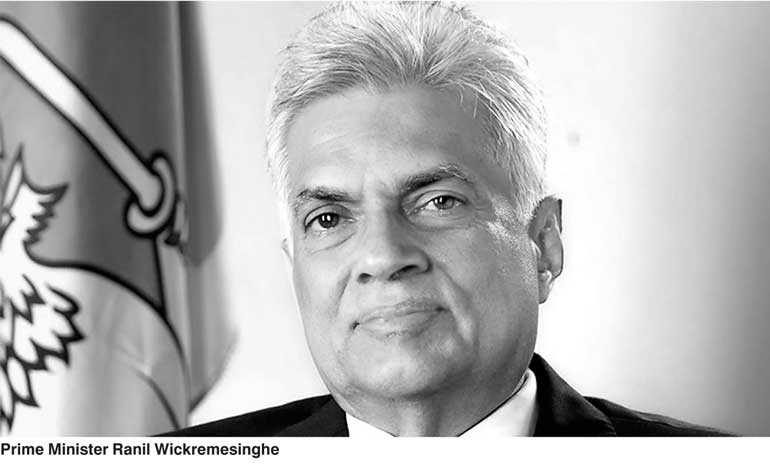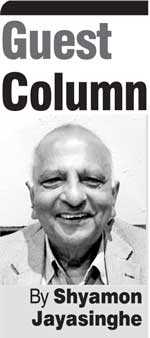Tuesday Feb 24, 2026
Tuesday Feb 24, 2026
Saturday, 12 May 2018 00:27 - - {{hitsCtrl.values.hits}}
Value of the major parties

“….to ask Ranil Wickremesinghe to name a successor is absurd. This is not the prerogative of a democratic leader, since successors must inevitably be named by the party men and women. For this to happen, the aspirant must prove himself and forge his way up as a true leader of men and resources. He must have the ticker for that. The situation must also be ripe for him and this is a most variable factor.”
Isn’t this a ridiculous suggestion made by UNP back benchers – or whoever others maybe?
LTTE’s devastating blow to our leadership
One of the most devastating blows given by LTTE supremo Prabhakaran to our national polity is his destruction of some leaders of considerable potential in the United National Party – Gamini Dissanayake, Lalith Athulathmudali, even G.M. Premachandra who died in the blast.
Lalith Athulathmudali was my Minister when I was Additional Secretary, Higher Education and Premachandra was my Minister when I was Secretary Labour and Vocational Training. I hadn’t worked with Gamini Dissanayake but I have studied him. Ranasinghe Premadasa was the last such capable leader to be blasted by the LTTE although he did have a short stint as President.
Ranil Wickremesinghe’s management of adversity
The party has since suffered terribly without any proper backers for its current leader, Prime Minister Ranil Wickremesinghe. No political party leader is perfect; it is the expectation that other party members behind him will fill up for any deficiencies of the leader-covering up the latter all the time. This never did happen in respect of Ranil.
In the many bad days and years in Opposition, Ranil had to face many tensions within the party, which had been then exposed to all kinds of manoeuvrings by the then President Mahinda Rajapaksa. Seventeen of his top-ranking party MPs had been bought over to “to strengthen the hand of Mahinda Rajapaksa.”
Ranil had two successive attempts in leadership challenge – one by Sajith Premadasa and the other by Karu Jayasuriya. Wickremesinghe was much more resilient material than his challengers thought he was and he trounced both attempts. He kept the Grand Old Party together over all the obstacles and impediments that a party in Opposition in a country like Sri Lanka does experience. That was no mean achievement. He predicted a UNP win in 2015 even five years before that happened. And it happened, although under the restricted conditions of a persisting Executive President who can put in spokes in the wheel.
 Resilience
Resilience
Yet, Ranil is there. Everybody in the Opposition kept the mantra go on that “Ranil is a loser”. He is no loser but a terribly tenacious guy. Wickremesinghe’s tenacity has some elements grounded in Buddhist attitudes. It was the Buddha who showed silence when useless questions had been pelted at him (Pottapada Sutta). Likewise, Ranil Wickremesinghe remains silent when sterile brickbats are hurled at him. His strong point is his emotional management. Daniel Goleman who popularised the concept of emotional management gave numerous illustrations on how it works in his seminal work ‘Emotional Intelligence,’ where this skill (he called it EQ) had been decisive in the success of great leaders of corporations. It was not so much IQ, stated Goleman, but EQ that’s crucial. I see Ranil as an embodiment of EQ. People around him will call him names and shout at him but he manages to keep silent and cool and things happen to him. Not ruffled by blame or even praise, Ranil Wickremesinghe is the wise man in the Dhammapada.
I think the concerns of the United National Party and the Sri Lanka Freedom Party are also concerns for the nation. Both these groups of political forces have been at the backbone of our democratic stability. It is in the interests of our nation to preserve these major parties. Democratic Parliamentary politics is essentially bipolar with an electorate that tends to swing periodically one way or the other. Third political forces find it an uphill task to break through this syndrome.
Sri Lanka saw this with the old Left, which since cuddled up with the major parties. England has witnessed this and so has Australia with their respective Conservative and Labour Parties. Even the American non-Parliamentary set up sways between the Republicans and Democrats. Desirable or not this is the logic of the electorate.
The UNP, in particular, has been in real terms the Grand Old Party – the Master Party that has been responsible for most of the development work in our economy thus far. Beginning with the Gal Oya Development, numberless colonisation schemes were established by the party since D.S. Senanayake’s State Council days – Minneriya, Kawdivulawewa, Giritale and so many. The colonisation of the dry zones had been one of the great landmark achievements of our country.
In education, we had the Maha Vidyalayas and Madyamaha Vidyalas. More recently, we had the Free Trade Zones, garment factories and the Mahaweli Deveolpment Scheme. These were mostly UNP achievements. It is necessary that this party be intact and strong with new young leaders coming up to enrich it and take it forward.
How leaders emerge
The concerns of backbenchers, therefore, for leadership development are fair without doubt. On the other hand, my question is why place the responsibility of bringing up a new leadership rung rest solely on the party leader?
I began this piece with mention of the strong leadership rung of the UNP that had been liquidated by the LTTE intentionally. The leaders mentioned were those who forged their way largely alone by their sheer political skills and effort. They weren’t creations of any party leader. Anyone with leadership potential and political will naturally find his or herself in this way. He must carve the path for himself and be creative at that. There is no template path for this as “paths are made by walking”.
Witness Lalith’s idea of building the Mahapola project to the people. Witness Premadasa’s idea of the Gam Udawa. President JR did not ask them to do that. The idea occurred in their own minds and the spirit and will was there in them to show.
Take the case of Premadasa. He began amidst social handicaps – unfairly considered as of low birth. Yet, by sheer dint of will, self-push, innovation and hard work Premadasa was able to reach the top echelons of the UNP during an era when that party was known as a feudally-biased one. None could stop Premadasa’s meteoric rise. His son, Sajith, seems to think that power must fall into his lap and he seems waiting for that. A father’s laurels aren’t enough.
I don’t see any other leader at this point in time who can command the heights of the United National party. Sarath Fonseka comes to mind but he is relatively junior in the party unless he could conquer that handicap, as Premadasa did, and get to the top. There are other very young leaders who need time.
Conclusion
In this context, the cry for Ranil Wickremesinghe to back out is unrealistic and undesirable. Ranil is still capable of leadership even with his obvious faults – poor communication, poor PR and so on. The Opposition knows this only too well and this is why they have been gunning for Ranil Wickremesinghe.
On the other hand, to ask Ranil Wickremesinghe to name a successor is absurd. This is not the prerogative of a democratic leader, since successors must inevitably be named by the party men and women. For this to happen, the aspirant must prove himself and forge his way up as a true leader of men and resources. He must have the ticker for that. The situation must also be ripe for him and this is a most variable factor.
(The writer can be reached via [email protected].)